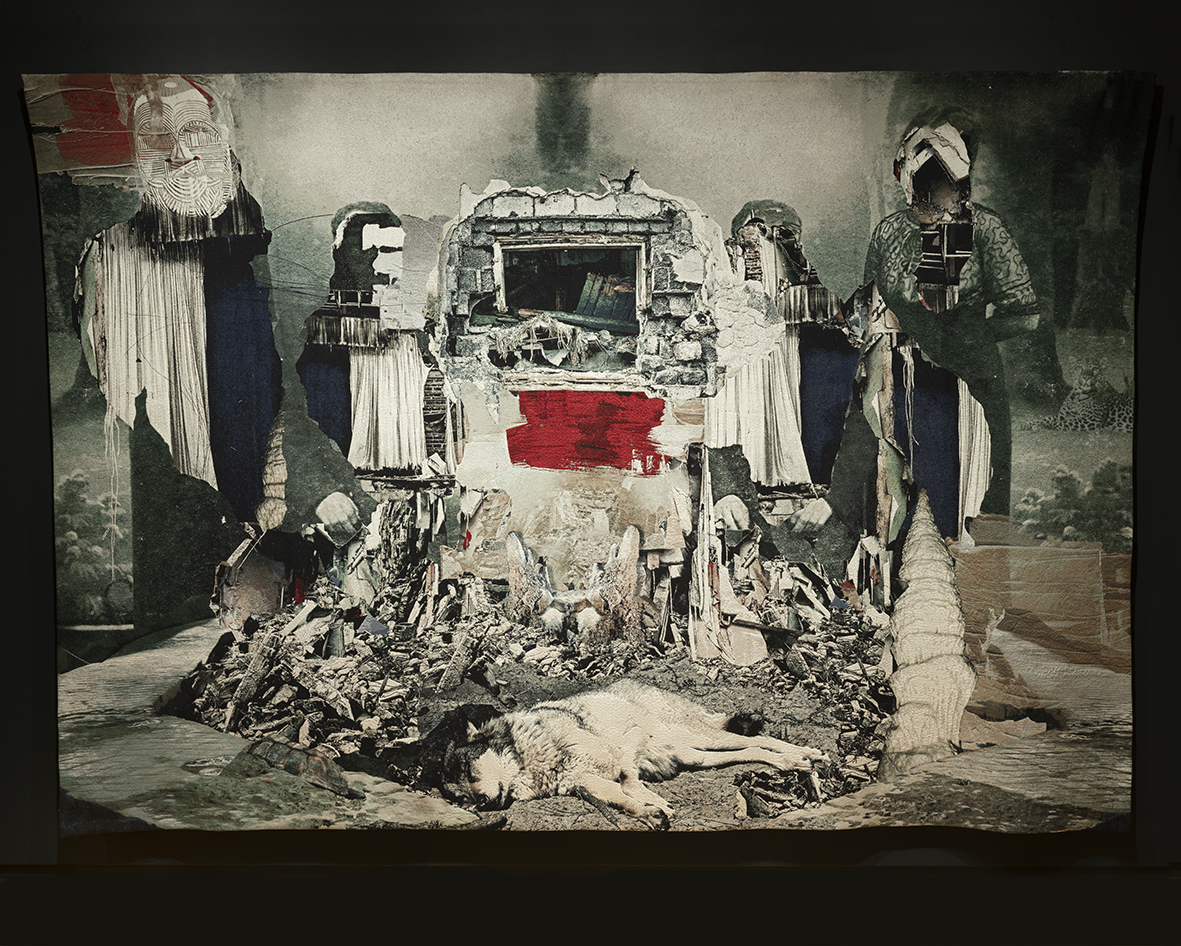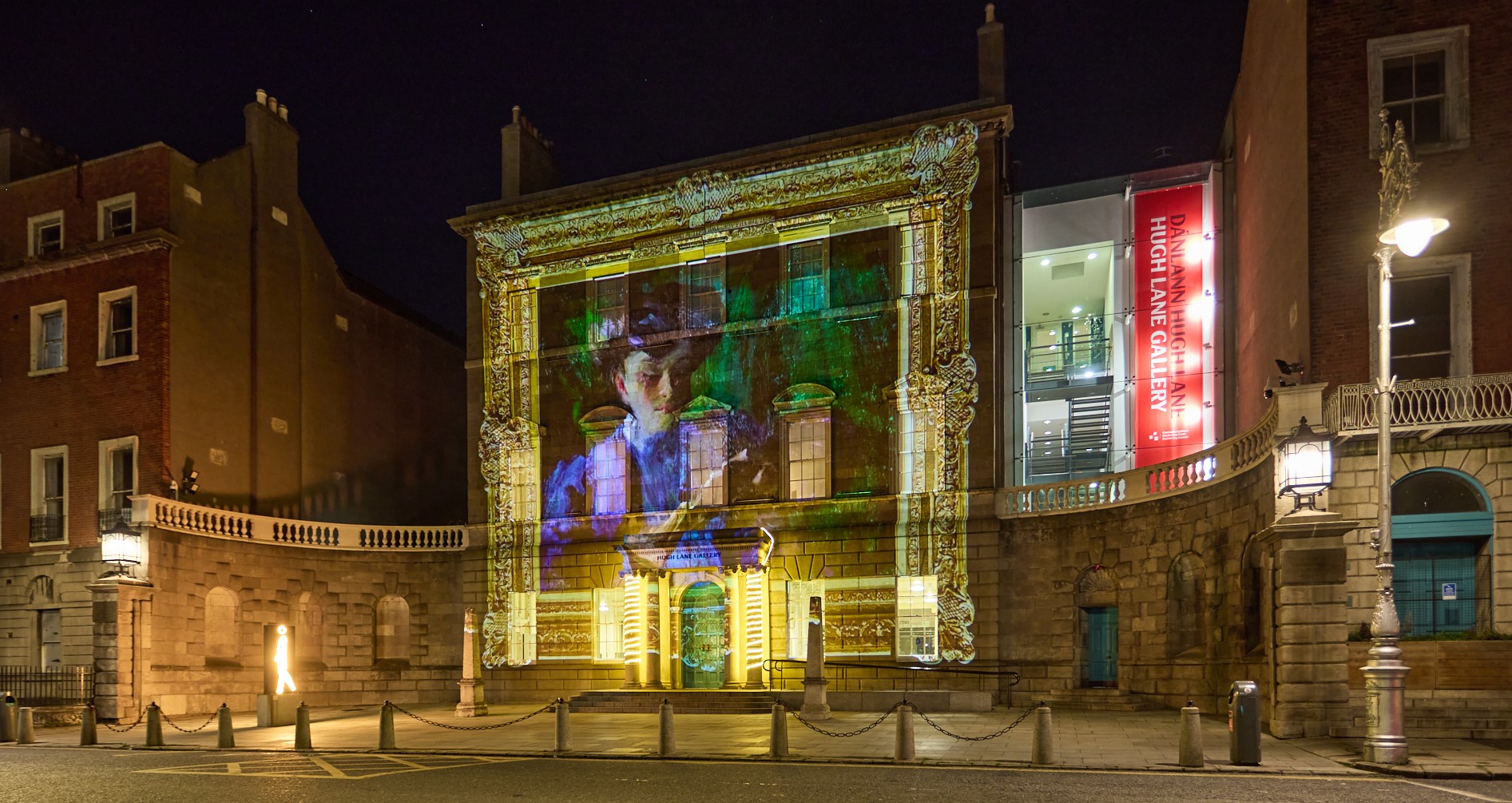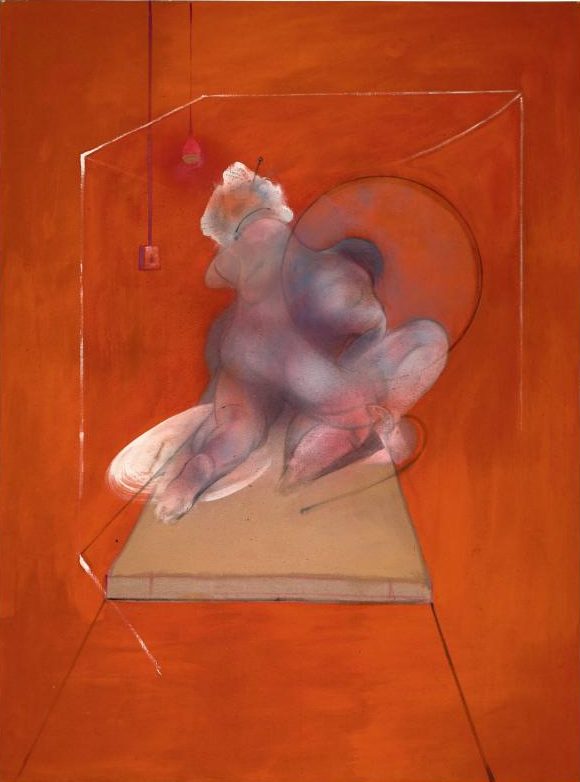With speakers: curator and artist Michele Horrigan, political geographer and cultural critic Rory Rowan, artist filmmaker Katherine Waugh, director of Sirius Arts Centre Miguel Amado and artist Fiona Hallinan.
Chaired by curator, independent researcher, writer, organiser and director of Fire Station Artist Studios Sara Greavu.
Curated by Sara Muthi.
Friday 26 September 2025, 10am-1.30pm
In The Dream Pool Intervals, Ailbhe Ní Bhriain collages colonial portraiture, catastrophic ruins, and geological time into a surreal and unsettling vision. The Quiet Collapse brings together artists, critics, and scholars to reflect on how the ruins of empire, ecological devastation, and war shape contemporary anxieties. What role can art play in confronting collapse, and how might the symbolic or dreamlike open new ways of sensing and imagining the future?
Join us for this morning of talks and discussion as part of the programme for the exhibition Ailbhe Ní Bhriain: The Dream Pool Intervals.
Free, book on Eventbrite or come on the day subject to availability.
-
Schedule
10am: Welcome by Sara Greveau, chair
10.10am: Michele Horrigan, artist and curator
Stigma Damages
Michele Horrigan will present an overview of Stigma Damages, her ongoing investigative artwork into heavy industry in Ireland, with a focus on Europe’s largest alumina refinery, Aughinish Alumina. Debates in its hinterland continue to link the refinery to deformed agricultural livestock, local health issues, and toxic deposits. With war in Ukraine, the Irish government refuse to apply sanctions despite proven links to military forces through the refinery’s owner, Moscow-based Rusal.10.35am: Fiona Hallinan, artist
In this presentation Hallinan will speak about her recent artistic research project, A Table and a Body: Disclosing Ultimology, a Practice of Paying Attention to Endings, and will elaborate on ways that the wake has come to act as a guiding framework in her work. This talk will draw on her experiences in developing the collaborative project We Turn Towards an Ending and Pay Attention, that looks at the demolition of Ireland’s second largest Catholic Church as an example of a rupture. This project, funded by the Arts Council of Ireland’s Visual Arts Project Award, included the film Making Dust, based on research by architectural historian Ellen Rowley, and installation with an accompanying symposium that was exhibited in the main gallery at VISUAL Carlow in Spring 2023 and is currently on show at Kunsthal Gent, Belgium until January 2026.11.00am: Miguel Amado, director of Sirius Arts Centre
The Spectre of Empire Is Haunting Us
Curator Miguel Amado uses the 2025 edition of the Liverpool Biennial, which posits cultural hybridity as the quintessential characteristic of the twenty-first century in response to Liverpool’s imperial legacy, as an example of the international trend in art and curating to explore questions of representation and politics within the context of broader critiques of modernity and colonialism. He discusses the practice of artist Alice Rekab, featured in that exhibition and with whom he has recently been collaborating on the solo show Clann Miotlantach / Mythlantics, currently touring across Ireland, to illustrate the reception and development of these ideas in the Irish art scene. In parallel, he discusses the solo shows by artist Daniela Ortiz at the Middlesbrough Institute of Modern Art in 2017 and Sirius Arts Centre in 2021, which he curated, to consider a practice that enacts a radical account of Eurocentric worldviews, as manifest in racism, state and border control, and patriarchal forms of dominance. He concludes with a reflection on the relationship between capital and the art establishment, addressing the work of artists Renzo Martens and the Cercle d’Art des Travailleurs de Plantation Congolaise, which he showcased at and collected for the Middlesbrough Institute of Modern Art in 2016, and who represented the Netherlands at the Venice Biennale in 2024.11.25am: Break
11.45am: Q&A with Michele, Fiona & Miguel facilitated by Sara
12.15pm: Katherine Waugh, artist film-maker
The Blind Spot
Using film excerpts from her practice, Waugh will question the legacy of enlightenment thought and its imbrication with colonialism, capitalism, the military-industrial complex and the disappearance of the animal as explored in her most recent film-essay I See a Darkness. Her film challenges the established fusion of artistic and technological representational models of our world by revealing a shadow history of cinema’s relationship with atomic science. I See a Darkness is a political and philosophical manifesto for seeing differently. Shot in Paris, Death Valley, MIT and the Nevada nuclear test site, the film examines the complex historical relationship between photography, cinema and science.12.40pm: Rory Rowan, political geographer and cultural theorist
Wars of Seeing: Anti-Imperial Struggle after ‘the End of the World’
After two decades of theorising the ‘end of worlds’ and the ‘loss of the future’ has a new moment emerged, epistemologically and politically, in response to the genocide in Palestine? This talk will argue that Palestine forces us here to contend not only with imperialism’s legacies but its present and its futures. This in turn is demanding a new relationship to the categories of ‘catastrophe’ and ‘collapse’ and how we might respond emotionally and aesthetically.1.05pm: Q&A with Rory & Katherine facilitated by Sara
1:30pm: Ends
-
Bios
Katherine Waugh’s trans-disciplinary art practice includes research-based, philosophically-framed projects across film, writing and curating, drawing on material often overlooked or hidden: shadow archives, neglected cultural narratives in film, art and literature, disappeared or challenging areas of knowledge. Films co-directed with Fergus Daly include The Art of Time, a film essay on the complex temporalities in contemporary art, and I See a Darkness, framed by an accompanying exhibition and an international symposium, curated and moderated by Waugh, at Photo Museum Ireland in 2022. Both films have screened internationally. Her curatorial projects include Schizo-Culture: Cracks in the Street, SPACE, London and several international projects based on the work of Antonin Artaud in collaboration with Semiotext(e) founder Sylvère Lotringer. Writing commissions include a book essay for Brian O’Doherty’s Structural Plays.
Michele Horrigan is an artist and curator. Her projects made over the last two decades have investigated narratives of place, dwelling and environment, with an ever-increasing focus on ecological issues. In 2025 she has presented exhibitions at The Shelley and Donald Rubin Foundation, New York and Tilburg University, The Netherlands. Additional presentations Tenerife Espacio de las Artes, Schloss Britz, Berlin; Frankfurter Kunstverein and Temple Bar Gallery & Studios, Dublin amongst others. She is founder and curator of Askeaton Contemporary Arts, facilitating artist experimentation and residencies, exhibitions and publication production in rural Limerick since 2006. Over one hundred projects have been realised with a particular interest in site-specific and social practice. Many artworks made in this context have subsequently been presented throughout the world in exhibitions, art biennials and film festivals.
Rory Rowan is an academic, critic, and activist. His research spans geopolitics, political ecology, and cultural criticism. He is Assistant Professor of Geography at Trinity College Dublin and a founding member of Rundale, a critical left media project engaged with contemporary socio-economic, political, and environmental issues across Ireland. His writing has appeared in e-Flux, Paper Visual Arts, Mute, and Spike amongst others, and he regularly contributes to academic journals and national news media. He is doing his best to unlearn imperialism in thinking, organising, and living with others.
Miguel Amado is a curator. His practice challenges ‘master’ aesthetics dominated by art history and the market, focusing on ‘subalternised’ art, whether through class or identity, and involves producing new work via collaboration with artists and communities. He has been Director of Sirius Arts Centre in Cobh, County Cork, since 2020. There, the programme involves producing and presenting new work that examines social themes, often featuring artists from and exploring underrepresented and underprivileged backgrounds and narratives. Key exhibitions that he has curated at Sirius Arts Centre and other Irish venues through touring schemes include artists from or based in Ireland, such as Samir Mahmood, Alice Rekab, and Sarah Browne, as well as international artists such as Anton Vidokle, Partisan Social Club, and Daniela Ortiz. His past posts include Cork Printmakers; Middlesbrough Institute of Modern Art and Tate St Ives in England; Abrons Arts Center and Rhizome at the New Museum in New York; and Visual Arts Centre in Coimbra, Portugal. He holds an MA in Curating Contemporary Art from the Royal College of Art, London.
Fiona Hallinan is an artist, researcher, filmmaker and, alongside curator Kate Strain, co-founder of the Department of Ultimology, based between Brussels, Belgium and Cork, Ireland. Her doctoral research at LUCA School of Arts, KU Leuven, (scheduled for defense in November 2025) explores the coming-into-being of Ultimology, a practice of paying attention to endings as a tool for transformative discourse, through gathering knowledge of modes of attending to death such as the wake as guiding frameworks. Her film Making Dust premiered at the IFI Documentary Festival, Dublin in 2023 and has screened at numerous festivals including the Architecture Film Festival Rotterdam. She has written for a number of international publications, including the Encyclopaedia for Radical Helping, published by Thick Press. She is a current recipient of the Irish Arts Council Bursary Award.
Sara Greavu is the Director of Fire Station Artists’ Studios. Previously she was Curator of Visual Arts at Project Arts Centre and the curator, with Project, of the Irish Pavilion at the Venice Biennale (2024) with the artist Eimear Walshe. Prior to this she worked at the Centre for Contemporary Art, Derry; VOID Arts Centre; and Outburst Arts, Belfast as well as working independently as a curator, writer and organiser. Independent projects include Open the book at a different page, a research exhibition produced with artist Ciara Phillips and former members of the Derry Film and Video Workshop, which dealt with intertwined political and cultural initiatives in Derry in the 1980s.






